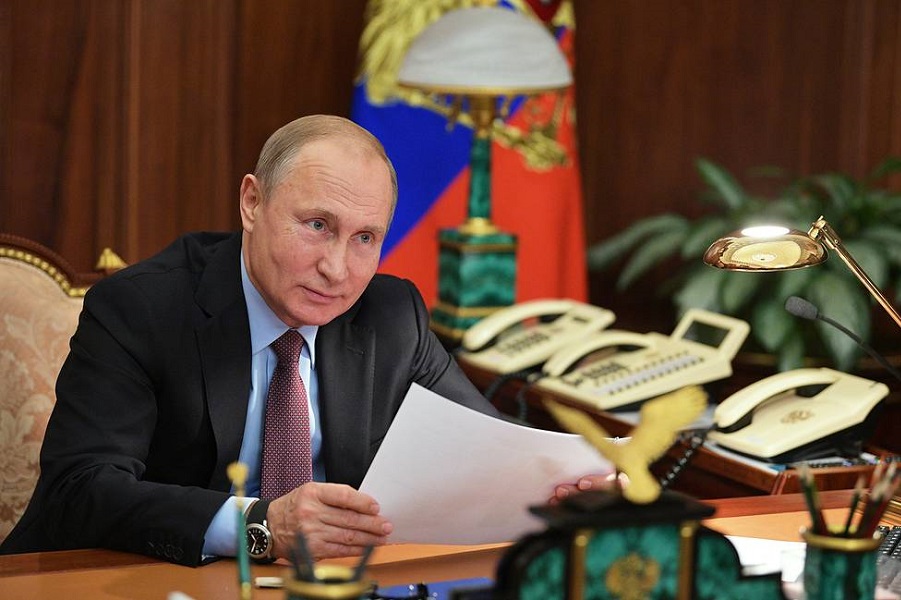Putin celebrates his birthday
By Aliheydar_Rzayev Monday, 07 October 2019 2:03 PM

The Russian president, who turns 67 on 7 October, is going to celebrate the date with his family and close ones in the countryside, his spokesman Dmitry Peskov revealed. Prior to this, Vladimir Putin went to Russia’s pristine forests.
Peskov pointed out that the Russian commander-in-chief, who is turning 67, will spend the day "with relatives and friends outdoors”.
This is in contrast with his previous birthdays, which he has preferred to spend with his former or acting counterparts.
Last year, former Italian Prime Minister Silvio Berlusconi was one of those invited to the Russian leader’s birthday. The former Italian PM even posted a photograph on his Facebook page, saying that he was flying "to my friend Vladimir Putin".
In 2017, Putin said that he had celebrated his birthday with Chinese President Xi Jinping, "drinking vodka and eating sausages". The two heads of state are known to have very good relations and earlier in 2019, the Russian president even presented Xi with ice cream, which he likes a lot, media reported.
Vladimir Putin was born on October 7, 1952 in Leningrad. “I come from an ordinary family, and this is how I lived for a long time, nearly my whole life. I lived as an average, normal person and I have always maintained that connection,” Mr Putin recalls.
In 1970, Vladimir Putin was admitted to law department at Leningrad State University.
After graduating from Leningrad State University, Putin was assigned to work in the state security agencies.
He was first appointed to the Directorate secretariat, then the counterintelligence division, where he worked for about five months. Half a year later, he was sent to operations personnel retraining courses.
Mr Putin spent another six months working in the counterintelligence division.
Then Mr Putin returned again to Moscow to study at the Andropov Red Banner Institute, where he was trained for his trip to Germany.
After returning to Leningrad from Dresden in 1990, Vladimir Putin found new job as assistant to the rector of Leningrad State University, in which position he was responsible for international relations.
Starting in June 1991, Putin began work as Chairman of the Committee for International Relations at the St Petersburg City Hall, and from 1994, concurrently held the position of Deputy Chairman of the St Petersburg City Government.
After starting work at the City Hall, Putin sent in his resignation from the KGB.
In 1996, Vladimir Putin moved with his family to Moscow, where he was offered the post of Deputy Chief of the Presidential Property Management Directorate.
His career rise was rapid. In March 1997, he was appointed Deputy Chief of Staff of the Presidential Executive Office and Chief of Main Control Directorate. Busy with work as he was, he still found time to defend his doctoral thesis on economics at the St Petersburg State Mining Institute.
In May 1998, Putin was made First Deputy Chief of Staff of the Presidential Executive Office, and in July 1998, he was appointed Director of the Federal Security Service. From March 1999, he also held the position of Secretary of the Security Council of the Russian Federation.
In August 1999, Putin was appointed Prime Minister of the Russian Government. The post was offered to him by then President Boris Yeltsin.
As Putin later recalled, “Mr Yeltsin invited me to come and see him and said that he wanted to offer me the prime minister’s job. <…> Incidentally, he never used the word ‘successor’ in his conversation with me then, but spoke of becoming ‘prime minister with prospects’, and said that if all went well, he thought this could be possible”.
Putin described his time in the prime minister’s office as an honour and an interesting experience. “I thought then, if I can get through a year that will already be a good start. If I can do something to help save Russia from falling apart then this would be something to be proud of.”
Shortly before the New Year of 2000 rolled in, President of Russia Boris Yeltsin proposed that Vladimir Putin become Acting President.
On December 31, 1999, Vladimir Putin became Acting President of the Russian Federation.
Vladimir Putin was elected President of Russia on March 26, 2000, and was re-elected to a second term on March 14, 2004. On May 8, 2008, he was appointed Prime Minister by presidential executive order.
Vladimir Putin was re-elected to a second presidential term on March 14, 2004.
On May 8, 2008, Vladimir Putin was appointed Russian Prime Minister by presidential executive order.
In November 2011, the delegates at United Russia’s 12th party congress approved Vladimir Putin as their candidate in the presidential election. On May 12, 2012 to date the President took his office.




























Add new comment